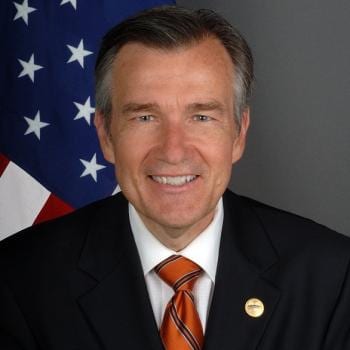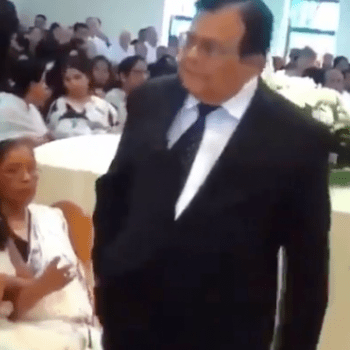Below is an essay, reprinted here in its entirety, from this afternoon’s Washington Post, by Fr. William Byrne, who works as the Secretary for Pastoral Ministry and Social Concerns for the Archdiocese of Washington:
In light of recent news this seems like a good time to explain (or review, in the case of Catholic readers) the importance of the Sacrament of Holy Communion to Catholics and the obligations it places on both the priest and the communicant.
As Catholics present themselves for Holy Communion, the priest or delegated minister says, “The Body of Christ” and “The Blood of Christ.” The communicant responds, “Amen.” This brief interaction expresses a much deeper reality of the belief in what the Church teaches about the Eucharist, the proper disposition of the one receiving Communion and the pastoral charity of the priest.
As Catholic Christians, we believe that the Eucharist is the real presence of Jesus Christ. It is not just a symbol, a wafer or a cup of wine. Jesus is truly present – Body, Blood, Soul and Divinity. Because of this we believe that to receive Communion, a person should be in the state of grace, which means that they are not conscious of having committed a sin serious enough that it ruptures their relationship with God. As with any relationship, it is not just a one-sided judgment that determines what hurts the relationship with God. This determination is based on what the Church teaches objectively from sacred Scripture and tradition of Christian experience. If a person is conscious of having committed a grave sin, he or she may not receive Communion until they have received absolution in the Sacrament of Reconciliation. A person who is conscious of grave sin but has no opportunity to go to Confession may receive Communion for a serious reason, but first that person must pray to Christ expressing their sorrow, also known as a perfect act of contrition, and have the intention of going to Confession as soon as possible.
The priest has an obligation to make sure that the sacraments are respected, and any person who obstinately perseveres in manifest grave sin is not to be admitted to Holy Communion. Ideally, the priest will handle such a situation pastorally by discussing the consequences of such sin with the person privately before actually denying them Communion.
The Archdiocese of Washington recognizes that the prime obligation to determine one’s preparedness to receive Communion falls to the persons who are presenting themselves for Communion. In extreme cases where someone has been formally excommunicated or is trying to use the Eucharist to make a political statement it is appropriate to consider denying Communion. The reception of the Eucharist is a blessing and a grace. We should receive Jesus with the intention of becoming more like him. No one is entitled to the Eucharist. It is a free gift and should be received with humility and reverence.
The Second Vatican Council proclaimed that the Eucharist is the source and summit of the Christian life. As such it is a sign of unity, but it must be a unity that is based on authentic Church teaching and mutual respect in charity.
Fr.. William Byrne is Secretary for Pastoral Ministry and Social Concerns for the Archdiocese of Washington and pastor of St. Peter Church on Capitol Hill.











